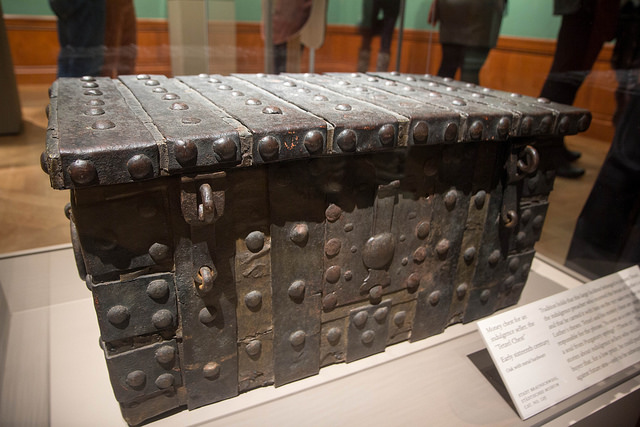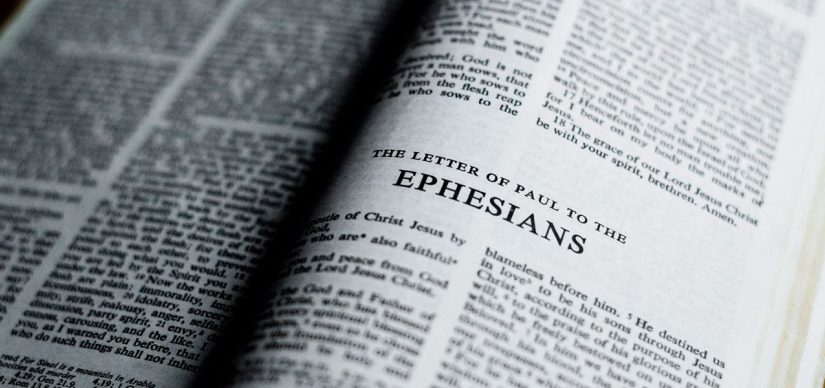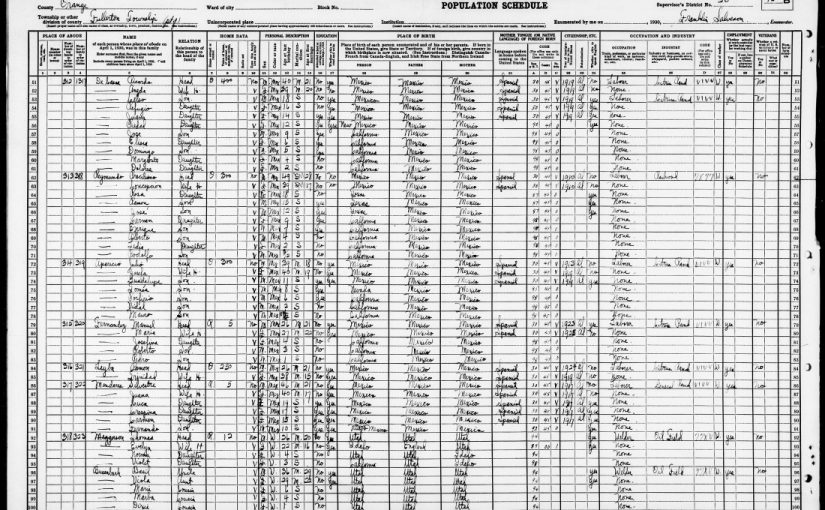As [Jesus] was setting out on a journey, a man ran up and knelt before him, and asked him, “Good Teacher, what must I do to inherit eternal life?” Jesus said to him, “Why do you call me good? No one is good but God alone. You know the commandments: ‘You shall not murder; You shall not commit adultery; You shall not steal; You shall not bear false witness; You shall not defraud; Honor your father and mother.’” He said to him, “Teacher, I have kept all these since my youth.” Jesus, looking at him, loved him and said, “You lack one thing; go, sell what you own, and give the money to the poor, and you will have treasure in heaven; then come, follow me.” When he heard this, he was shocked and went away grieving, for he had many possessions.
Then Jesus looked around and said to his disciples, “How hard it will be for those who have wealth to enter the kingdom of God!” And the disciples were perplexed at these words. But Jesus said to them again, “Children, how hard it is to enter the kingdom of God! It is easier for a camel to go through the eye of a needle than for someone who is rich to enter the kingdom of God.” They were greatly astounded and said to one another, “Then who can be saved?” Jesus looked at them and said, “For mortals it is impossible, but not for God; for God all things are possible.”
Peter began to say to him, “Look, we have left everything and followed you.” Jesus said, “Truly I tell you, there is no one who has left house or brothers or sisters or mother or father or children or fields, for my sake and for the sake of the good news, who will not receive a hundredfold now in this age—houses, brothers and sisters, mothers and children, and fields with persecutions—and in the age to come eternal life. But many who are first will be last, and the last will be first.”
Mark 10:17-31
My sermon from the 21st Sunday after Pentecost (October 14, 2018) on Mark 10:17-31. Listen to the recording at the bottom of the page or read my manuscript below.
****************************
What have you loved this week?
Better yet, what have you said “love” to this week?
If a random stranger asked each of us to make a list of every love we said, I’m sure our first attempt would be something presentable. We’d put down the names of our families, our friends, and some random event we saw and enjoyed. The stranger would take a look at our list and probably force us to do it again. We’d have to admit that maybe we didn’t actually say “love” out loud this week and we’d erase the names on the list. Or maybe we’d need to add to it after remembering how many times we said we loved that shirt or song or food or whatever. Some of us hesitate saying the word love while others are a bit more carefree. This inhibition or exuberance around the word love comes from somewhere. In some cultures, boys are told to not say “love” – to reserve it to the point where we might not say it at all. We might have learned this kind of love language from our families, mimicking how often our parents said they loved us or each other. Or we might be very careful with the word love because we’d experienced too much heartbreak. Love is a powerful word. It’s a noun, a verb, an emotion, an action, an experience, a reality, and – according to Scripture – Love is God itself. Yet in the gospel according to Mark, the word “love” appears in only 3 verses. And in two of those verses, Jesus was quoting the Old Testament. So there’s only one place in all this gospel where Mark used the word “love” all on his own. And that happened in our reading today – at verse 21 – when Jesus looked at the rich young man and loved him.
I’ve joked in the past that our next church stewardship and funding campaign should be based on these verses from the tenth chapter of Mark. When people ask how much they should give, we could point to verse 21 and then sit down. Instead of asking for a tithe, for just 10% of what we make, Jesus seems to be asking for it all. He continued this theme a few verses later by pointing out how hard it is for those with riches to enter the Kingdom of God. Now, over the centuries, we’ve tried really hard to run away from Jesus’ words in this text. In the middle ages, a theory developed centered on Jesus’ words about a camel and a needle. Some theologians claimed there was a gate in ancient Jerusalem called “the needle,” and that a camel, using funky body positions, could inch its way through it. So if this was right, then those with wealth could enter the kingdom of God but they’d need to be a bit more flexible to make that happen. The problem is that theory is completely work. There was no gate named “the needle” and Jesus really said that it’s easier for a camel – a giant animal – to go through the eye of a sewing needle than for a rich person to enter the kingdom of God. Jesus’ words here can scare us – so, at times, we’ve turned against the rich young man saying he lied about keeping the law. Or we say he’s too rich, a stand-in for a different wealth class of people we’re not apart of. But that kind of thinking is designed to get us off the hook because we can always imagine someone who is richer than us. My personal trick is to do a close reading of the text, notice that Jesus said to give everything to the poor, and then point to my mortgage and my student loan debt from seminary. We try, as best we can, to manage this text, to make it feel safe. Because, if we have a bed to sleep in, if we know where our next meal is coming from, if we have health insurance, and if we have access to credit, jobs, and other kinds of opportunities – these riches are ones that we don’t want to give to that rich young man. We don’t want to be him. Because we also know that when Jesus showed him, the only person in the entire gospel according to Mark described as being loved – when Jesus showed him how to change his life, he left – sad and full of sorrow.
It’s hard to imagine experiencing Jesus’ love – and then leaving, feeling sad. We don’t want to meet God through prayer, or at Holy Communion, or through the love of our neighbors and have our sense of self torn in two. The rich young man was loved not because he was rich or faithful or because he followed the rules. Jesus just loved him because that’s who Jesus is. That gift of love is something we all want. But it’s a gift that isn’t a commodity that we can store and keep. Rather Jesus’ love is an action, a force, that compels us to discover the truth about who we are. We want to turn Jesus’ love into something we can possess because if we can do that, then we can fit Jesus into the society we’ve already created. People’s worth, we think, is based on what they are allowed to have: whether that’s authority, power, wealth, or status. We’ve defined people by what they possess and those with more are worth more. We act as if life is about accumulating experiences, opportunities, and whatever helps us think we are “self-sufficient.” In other words, we want to earn and grab onto what we imagine eternal life to be. The danger of wealth, of this constant need to possess, is that it can trick us to think we are following God’s rules while we self-justify every divide we create in the world. It’s at that moment when we turn Jesus into a possession instead of a Savior that Jesus finally tells us the truth, undoing the world we’ve built up while showing us something new.
Jesus does more in this passage than tell the rich young man to sell what he owns. Jesus also shows him how to love. We see in Jesus’ own actions and words a formula for what love looks like. In verse 21, Jesus’ response to the rich young man is to look and see him. Jesus, in that moment, sees everything about him – where he comes, where he’s going, and what his entire life looks like. Love can’t be limited to only ourselves. Love compels us to fully see the other – and in that process, connect with them. So after seeing the rich young man, Jesus tells him to sell what he owns so that he can come and follow him. Every one of the actions Jesus highlights points to what love is all about. Love isn’t about gaining a possession. Love is about gaining a relationship with the creator of the universe and, in that process, forming a bond with the world and all the people God loves. We want to split the world and it’s people into groups based on what we think they should possess. Yet Jesus’ love breaks through the dividing lines we draw up, connecting us to each other even though the world wants to keep us apart. Through Christ, we are invited to say “love” to more people than we might, at first, admit. We are called to make that “love” a reality by using the gifts God gave us, including our wealth, to create connections rather than re-entrenching our divisions. And it’s through Jesus where we discover a new way of life that is about more than giving something up. Instead, when we connect with each other, loving people in the same way Jesus first loved us, that’s when we’ll notice that our entire life is finally starting to grow.
Amen.
Podcast: Play in new window | Download






